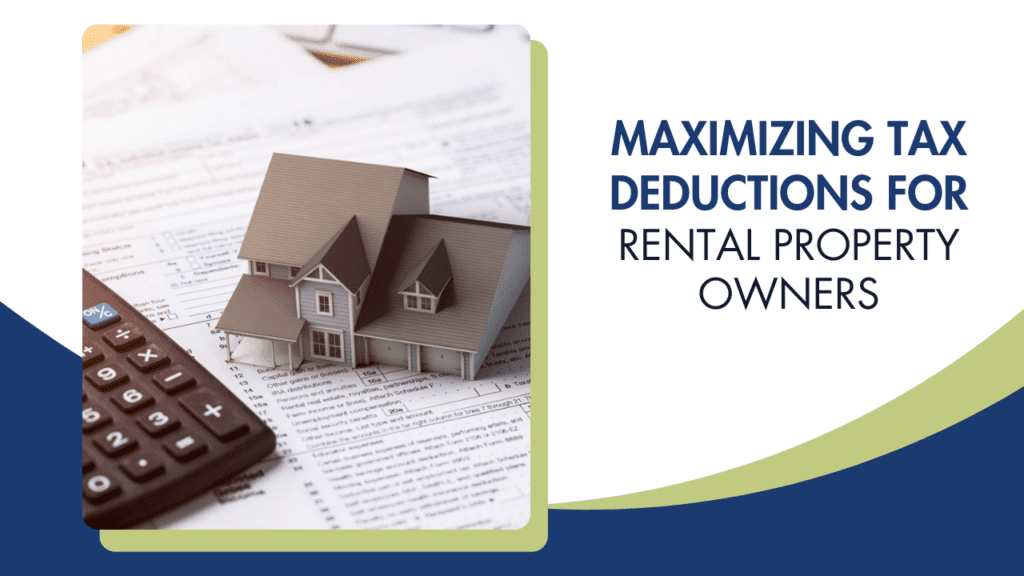
How do you feel about taxes?
Actually, that’s a silly question. What we are really asking is: what do you know about taxes?
Dayton rental property owners need to understand how to optimize tax deductions on their investment properties. This is crucial for your profitability and your compliance with tax laws. When you have the right knowledge and you’re working with the right professional partners, you’ll find you can significantly reduce your taxable income, ultimately increasing your ROI.
We get a lot of questions about taxes, and while we are not professional accountants, we can provide some direction and insight based on our role as Dayton property management experts. Let’s explore effective strategies for maximizing your rental property tax deductions, ensuring you benefit fully from the deductions available to you.
The Impact of Tax Deductions on ROI
Maximizing tax deductions can have a substantial impact on the return on investment (ROI) for rental property owners in Dayton. By effectively leveraging allowable deductions such as mortgage interest, property management fees, maintenance costs, and depreciation, you can lower your taxable income and keep more of the money you’ve earned.
By reducing your tax liability, you can retain more of your rental income, which can then be reinvested into the property or used for other investment opportunities. Over time, these savings compound, resulting in a more favorable ROI.
When we talk about short-term and long-term income that’s earned from rental investments, tax savings are included. These deductions and write-offs will benefit you now and in the future.
Understanding and applying these deductions not only enhances cash flow but can also influence property values, as well-maintained rental homes and financially savvy landlords are likely to attract higher-quality tenants.
Understanding Rental Property Tax Deductions
What are we talking about when we tell you to be aware of all your tax deductions and exemptions?
Rental property tax deductions allow landlords to deduct certain expenses associated with owning and managing rental properties. The IRS sees your rental property as a business, even if you’re only renting out one home. These deductions are crucial for offsetting rental income and reducing tax liability. By understanding the full range of deductible expenses, you can maximize your potential savings.
Key Deductions Available to Dayton Real Estate Investors
Make sure you’re aware of all these deductions when you’re managing your finances, filing your taxes, and consulting with both your Dayton property manager and your CPA or tax accountant.
- Mortgage Interest
One of the most significant deductions available to Dayton rental property owners is mortgage interest. Assuming you financed your property, your interest can be deducted. For most investors, it’s a pretty significant amount, especially considering you can deduct the interest paid on loans used to acquire and improve rental properties.
This deduction can dramatically reduce your taxable income, especially in the early years of your mortgage when interest payments are higher.
- Property Depreciation
This is a generous deduction for rental property owners in Dayton, too. The IRS allows landlords to deduct a portion of the property’s value each year through depreciation. Residential rental properties can be depreciated over 27.5 years, translating to a substantial annual deduction. Be sure to calculate and claim this deduction accurately to maximize your savings. You can only depreciate the physical property you own, not the land it sits on.
- Repairs and Maintenance Costs
Routine repairs and maintenance expenses are fully deductible. Whether it’s fixing a leaky roof or replacing a broken appliance, these costs can be subtracted from your rental income. Keep detailed records of all repair expenses to ensure you don’t miss out on potential deductions.
- Dayton Property Management Fees
If you partner with a property management company to oversee the leasing, management, and maintenance of your rentals, the fees paid for those services are deductible. This includes costs associated with tenant screening, rent collection, and maintenance coordination. If you pay a commission for tenant placement, that’s deductible, too.
- Insurance Premiums
Premiums paid for rental property insurance policies are deductible. This includes coverage for fire, theft, flood, and landlord liability insurance. Ensure all premiums are accounted for when filing your taxes.
- Utilities
Are you paying utilities for your rental properties, such as water, gas, or electricity? This isn’t terribly common, but sometimes with multi-family properties, it happens. And, you can deduct these expenses.
- Professional Services
Fees paid to accountants, attorneys, and other professionals related to your rental activity are deductible. These services must directly impact the management or operation of your rental business to qualify.
Tips for Maximizing Dayton Real Estate Deductions
How can you use these deductions to your best advantage? Here’s our list of recommended actions:
- Maintain Detailed Records. Keep comprehensive records of all expenses associated with your rental property, including receipts and invoices. This documentation is vital for substantiating your deductions in case of an audit.
- Understand Local and Federal Tax Laws. Stay informed about any changes in tax laws that may affect your deductions. Local regulations in Dayton can also influence what deductions are available.
- Consult a Tax Professional. Unless you’re a tax expert yourself, a knowledgeable tax advisor specializing in real estate is essential. Your professional partner can offer invaluable insights and strategies tailored to your unique circumstances.
- Utilize Tax Software. Consider using tax preparation software designed for landlords. These programs can help you track expenses, calculate deductions, and streamline the filing process.
- Review Annually. Review your tax strategy annually to incorporate new deductions or changes in tax law, ensuring you’re always maximizing your savings.
 For Dayton rental property owners, taking full advantage of the available tax deductions is a smart way to increase profitability. By understanding the range of available deductions, tracking and documenting your expenses carefully, and surrounding yourself with reliable professionals, you can enhance the financial performance of your rental investments.
For Dayton rental property owners, taking full advantage of the available tax deductions is a smart way to increase profitability. By understanding the range of available deductions, tracking and documenting your expenses carefully, and surrounding yourself with reliable professionals, you can enhance the financial performance of your rental investments.
No one loves thinking about their taxes. But, when you’re renting out properties in Dayton, there are a few good reasons to think carefully about your taxes. Let’s answer any questions you might have. Contact us at ManCo Property Services, because if it’s a property managed by ManCo, life just got better!
